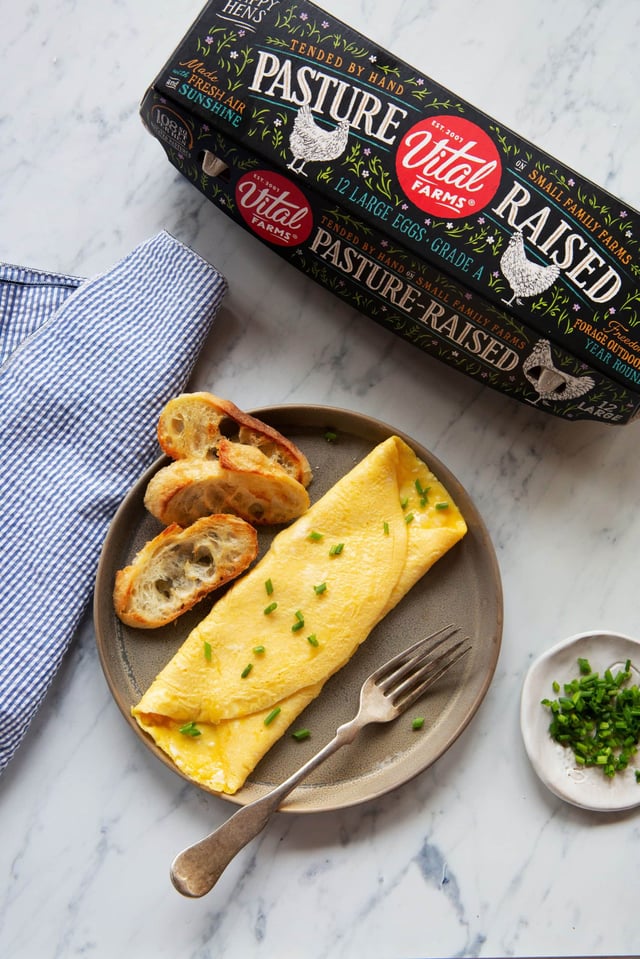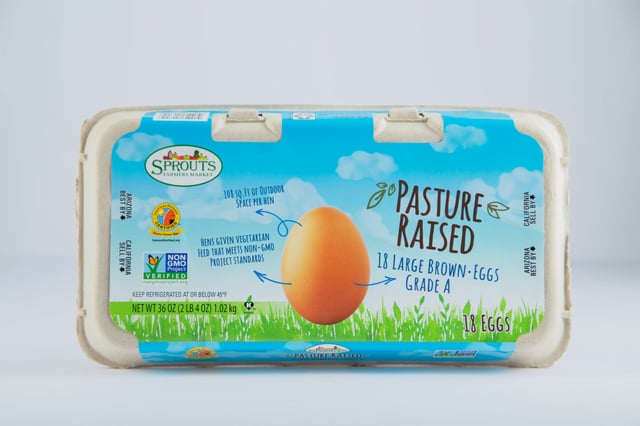Scrambling to Meet Shoppers’ Preference for Specialty Eggs
Today’s consumers are increasingly concerned about where their food comes from and how it was produced. Nowhere is this more apparent in grocery than in the egg aisle, where consumer preference for ethically raised eggs continues to expand.
According to Alpharetta, Georgia-based United Egg Producers, 30% of all egg production is from hens laying “specialty eggs” — a category that includes cage-free, organic and pasture-raised. Specialty egg production has doubled since 2016. The U.S. Department of Agriculture predicts that by 2026, 66% of all shell eggs sold will be specialty eggs — again, more than doubling in under five years.
This market growth is evident at several specialty egg producers. For instance, Austin, Texas-based Vital Farms, a Certified B Corporation that offers a range of ethically produced foods, reported that for its first quarter ended March 27, net revenue exceeded $77 million, up more than 31% versus last year. According to Chicago-based market research firm SPINS, the farming company is the fastest-growing brand in dollars in the egg category.
Meanwhile, fresh egg producer Cal-Maine Foods Inc.’s specialty eggs accounted for about a third of the total volume of eggs sold during its quarter ended Feb. 26, compared with 27.4% during the prior-year period. According to the Ridgeland, Miss.-based company, 24% of revenue generated by the sale of its shell eggs were cage-free eggs. To expand its cage-free production capabilities, Cal-Maine Foods recently approved new capital projects estimated to be worth $82 million.
Ruffling Feathers
After years of battles with the food industry, the cage-free market has been a huge success for the animal welfare movement.
“Major companies around the world are ditching cages, and consumer demand for cage-free eggs is growing,” affirms Alexandria Beck, director of the Open Wing Alliance (OWA), which was initiated in 2016 by The Humane League, based in Rockville, Md. “It’s time for all food companies to take the necessary steps to meet global animal welfare standards proving that they take human health and animal welfare seriously.”
For years, animal welfare groups like the OWA have raised concerns over egg-laying hens being forced into overcrowded battery cages. Complaints were made about the sharp wire cages preventing the birds from carrying out basic natural behaviors, causing many to be injured and even die. Animal welfare groups also pointed out that battery cages pose serious health risks to humans by creating poor living conditions more likely to give rise to Salmonella contamination.
Today, nearly 2,900 cage-free commitments, more than 100 of which encompass a company’s entire global supply chains, have been made by some of the largest companies in the world, including Nestlé, Aldi and Kraft Heinz. According to the “2022 Cage-Free Fulfillment Report” from the OWA, 88% of all cage-free egg commitments with deadlines of 2021 or earlier have been fulfilled.
This transition is being made as cage-free egg mandates take effect, essentially preventing any caged-system eggs from being sold in some states. Arizona is the latest state to go cage-free. The nine other states protecting egg-laying hens are Utah, Colorado, Michigan, Washington, Oregon, California, Massachusetts, Rhode Island and Nevada.
Retailers Crack Open Cages
Food retailers recognize that customers’ preferences are changing with improved customer access to sustainable and ethically sourced products. Numerous retailers have either implemented cage-free requirements or plan to do so within a few years.
For example, Sprouts Farmers Market is now sourcing all shell and liquid eggs sold at its 370-plus stores from cage-free, organic or free-range farms. The grocer’s Our Brands eggs have been “cage-free or better” since 2016, offering such attributes as being pasture-raised.
“Sprouts shoppers are conscious of where their food comes from, and we’re pleased to now offer cage-free or better eggs across the category as part of our ongoing commitment to improved animal welfare,” says Kim Coffin, SVP of grocery at Phoenix-based Sprouts. “We’re continuously engaging with suppliers, NGOs and stakeholders to ensure our policies and targets for continuous improvement are meaningful and help drive the industry forward.”
Reflecting the latest progress for The Kroger’s Co.’s phased transition to cage-free eggs, the Cincinnati-based food retailer recently partnered with Kipster Farms, an egg production company founded in the Netherlands, to bring carbon-neutral eggs to U.S. stores and e-commerce for the first time in late 2022 under Kroger’s multibillion-dollar Simple Truth brand.
The Kipster system uses the highest standards of animal welfare, providing a cage-free, natural-like wooded environment with plenty of variety, daylight and outdoor scurrying space. Kipster aims to help create a food system in which animals don’t pollute but rather help clean up byproducts of food processing. In this way, chickens upcycle food waste into eggs, meat and fertile manure.
“Simple Truth is excited to partner with the innovative team at Kipster to further elevate our brand’s purpose to be a force for good,” says Brad Studer, senior director, Our Brands for Kroger. “These Simple Truth and Kipster eggs will be produced in a closed-loop system that aligns with the highest health and welfare standards for people and animals. These sustainable, zero-waste eggs reflect yet another milestone in Kroger’s Zero Hunger | Zero Waste mission to help create communities free of hunger and waste.”
In its recently published environmental, social and governance report, Woonsocket, R.I.-based CVS Health Corp. revealed that it has stepped up its goal to transition to selling 100% cage-free eggs. In 2015, the company said that it would make the transition by 2025, but as of April 1, it noted that the goal would be achieved by the end of 2022 at its 9,900 pharmacy-based stores.
Another retailer that met its animal welfare goal ahead of schedule is Walgreens. In 2016, the Deerfield, Ill.-based company committed to providing 100% cage-free shell and liquid eggs in stores nationwide by 2025. Through a dedicated commitment to advancing conversations with suppliers, Walgreens accelerated its pledge to provide 100% cage-free shell and liquid eggs in its stores nationwide, also by the end of this year.
Egg-Citing Innovations
While cage-free eggs are becoming the industry norm, there are other innovative areas that grocers should be aware of.
One of the fastest-growing egg segments is the plant-based category. In addition to such products being perceived as more animal- and planet-friendly, more consumers are choosing plant-based products to improve their health. According to data from the Plant Based Foods Association, The Good Food Institute and SPINS, the plant-based egg category grew quickly in 2021, with a 42% increase in dollar sales. Over the past three years, plant-based egg dollar sales have risen by more than 1,000%. Further, with conventional egg dollar sales declining by 4% in 2021, plant-based eggs have grown to earn a nearly 0.6% share of the total egg market, versus a 0.05% share three years ago, making plant-based eggs a growth driver of the category.
Even celebrities are cashing in on this egg trend. Eat Just’s plant-based Just Egg product has two new celebrity investors: movie star Jake Gyllenhaal and tennis legend Serena Williams. The pair are showcased in the San Francisco-based company’s satire-rich campaign, “Really Good Eggs,” eating Just Egg as part of their healthy lifestyles. The campaign touts that Just Egg is healthier than conventional eggs, having no cholesterol and 69% less saturated fat.
Evo Food, a CPG company operating in the United States and India, is using science to create the next generation of plant-based substitutes for animal products. With increasing consumer demand for animal-free food alternatives, the company partnered with Boston-based Ginkgo Bioworks, which offers a horizontal platform for cell programming, to develop a method for producing animal-free egg proteins for use in Evo’s products, which were recently showcased in the United States for the first time in San Francisco on April 27.
“As consumers and food brands alike call for more sustainable food options, we are excited to collaborate with Ginkgo to pioneer a new class of animal-free ingredients,” says Kartik Dixit, CEO of Mumbai-based Evo Foods. “Evo is committed to playing a part in feeding our ever-growing world, and this partnership will support us as we develop next-generation products in this market.”
Meanwhile, a recent evaluation process by the Good Housekeeping Institute’s Nutrition Lab has verified Eggland’s Best shell eggs’ superior nutrition, earning them the Good Housekeeping Nutritionist Approved Emblem. This designation was created to help consumers lead healthier lives by empowering them to make informed food choices.
Compared with conventional eggs, Eggland’s Best eggs contain six times more vitamin D, 10 times more vitamin E, 25% less saturated fat, more than double the omega-3s and more than double the vitamin B12. The Cedar Knolls, N.J.-based company attributes this to its hens’ high-quality all-vegetarian diet, which contains healthy grains, canola oil, and a wholesome supplement of rice bran, alfalfa, sea kelp and vitamin E.
In regard to new product lines, Chicago-based Dutch Farms introduced its largest specialty egg line expansion at the beginning of the year. The company now offers its retail partners 12 specialty egg items: Free-Range Non-GMO Large, Pasture-Raised Organic Large, Free-Range Organic Large, Vegetarian Fed Cage-Free Large, Pasture-Raised Large, Organic Large, Organic Large 18-Pack, Organic Medium, Organic Medium 18-Pack, Cage-Free Large Pulp and Plastic, and Cage-Free Jumbo.
Dutch Farms has partnerships with local small family farms that raise hens that are free to roam and nest, and allow outdoor access, and even some that allow hens to forage for wild plants and food. Dutch Farms offers specialty eggs from birds fed diets also designed to increase the nutritional content of the eggs.
Over at Vital Farms, the company has added more color to its egg cartons. True Blues, a specialty line of pasture-raised heirloom blue eggs, has been available at Whole Foods Market locations since April. The line offers a Certified Humane dozen of entirely blue shell eggs produced according to the same animal welfare standards that Vital Farms is known for.
Vital Farms True Blues eggs are produced by heirloom breeds of hens, including Azur hens, that generate a unique pigment that causes them to lay naturally blue eggs. As with all of Vital Farms’ egg products, the hens are pasture-raised by family farmers who give them year-round outdoor access — at least 108 square feet of pasture to roam and forage — and maintain land that’s free of herbicides or pesticides.
“People are looking for new ways to bring novelty to their everyday, and eggs as a cooking staple are no exception,” says Heather Mace, director of brand management at Vital Farms.











